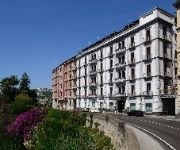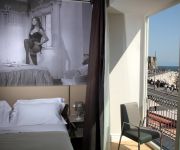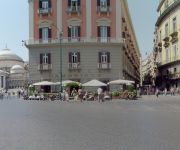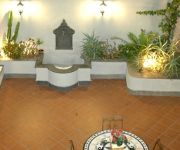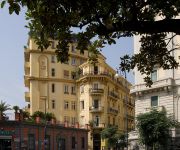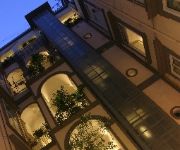Safety Score: 3,0 of 5.0 based on data from 9 authorites. Meaning we advice caution when travelling to Italy.
Travel warnings are updated daily. Source: Travel Warning Italy. Last Update: 2024-08-13 08:21:03
Delve into Vomero
The district Vomero of Naples in Province of Naples (Campania) is a district located in Italy about 115 mi south-east of Rome, the country's capital town.
In need of a room? We compiled a list of available hotels close to the map centre further down the page.
Since you are here already, you might want to pay a visit to some of the following locations: Marano di Napoli, Casavatore, Mugnano di Napoli, Arzano and Melito di Napoli. To further explore this place, just scroll down and browse the available info.
Local weather forecast
Todays Local Weather Conditions & Forecast: 16°C / 61 °F
| Morning Temperature | 12°C / 54 °F |
| Evening Temperature | 15°C / 59 °F |
| Night Temperature | 15°C / 58 °F |
| Chance of rainfall | 0% |
| Air Humidity | 62% |
| Air Pressure | 1017 hPa |
| Wind Speed | Light breeze with 4 km/h (3 mph) from East |
| Cloud Conditions | Scattered clouds, covering 43% of sky |
| General Conditions | Scattered clouds |
Monday, 18th of November 2024
16°C (61 °F)
16°C (60 °F)
Light rain, gentle breeze, overcast clouds.
Tuesday, 19th of November 2024
16°C (61 °F)
17°C (62 °F)
Moderate rain, moderate breeze, overcast clouds.
Wednesday, 20th of November 2024
18°C (64 °F)
16°C (60 °F)
Moderate rain, high wind, near gale, broken clouds.
Hotels and Places to Stay
Parker's Grand Hotel
Exe Majestic
Partenope Relais Boutique Hotel
Palazzo Alabardieri
MH Design Hotel
Hotel Cimarosa
Villa Margherita
B&B Casa Marga
Pinto Storey
Chiaja Hotel de Charme
Videos from this area
These are videos related to the place based on their proximity to this place.
Naples, Italy - Parking Management - Quick, No Problem Parking
Learn more at http://www.skidata.com Naples: A city full of sights and a city with innovative ideas for effective parking management. Quick, No Problem Parking speaks about the partnership...
3 Store Fuorigrotta al Sea Sport Festival
Lungomare Caracciolo, Sea Sport Festival. Intervista presso il gazebo di 3 Store Fuorigrotta, presente all'evento del 6 e 7 luglio 2013. Nella giornata di domenica il 3 Store Fuorigrotta ha...
Grand Hotel Parker's in Neaples, Italy
The 5 star Grand Hotel Parker's can be found in the heart of Naples, not far from Via dei Mille and Via Filangeri, the luxurious fashion streets of the city. It is also only a short walk from...
Antonella Mazziotti - Interior Designer
Video Presentation of Antonella Mazziotti's Art Works ----- Antonella Mazziotti nasce a Napoli nel marzo del '56. Fin da piccola ha voluto esprimere la sua personalità nell'arte; passava...
Bellissimo video: discesa col paracadute, Rotonda Diaz, Napoli
Video della discesa sulla Rotonda Diaz dal cielo di Napoli col paracadute.
Alex A recommends...Villa Floridiana
Magnificent view from the front terrace of Villa Floridiana in Naples. For more info go to: blog.andic.info.
Episodio 4: So Fidanzato con Francesco Paolantoni ed R-Store
Quarto episodio, ovviamente da non perdere, di .... "So Fidanzato". Questo episodio è dedicato a tutti i fan dell'iPhone, il quarto sketch è ..... pazzesco !! Una produzione con Francesco...
Antonio Emma alla presentazione di Scampia Trip
1° Luglio 2010, Spazio Feltrinelli. Intervento di Antonio Emma alla presentazione del libro Scampia Trip.
Videos provided by Youtube are under the copyright of their owners.
Attractions and noteworthy things
Distances are based on the centre of the city/town and sightseeing location. This list contains brief abstracts about monuments, holiday activities, national parcs, museums, organisations and more from the area as well as interesting facts about the region itself. Where available, you'll find the corresponding homepage. Otherwise the related wikipedia article.
Mergellina
Mergellina is a coastal section of the city of Naples, Italy. It is located in the quartiere of Chiaia, demarcated by two streets: via Caracciolo e via Partenope. It stands a the foot of the Posillipo Hill and faces the Castel dell'Ovo. The name derives from that of a shorebird called "mergoglino".
Vomero
Vomero is a central district of Naples, with a population of about 48,000.
Certosa di San Martino
The Certosa di San Martino is a former monastery complex, now a museum, in Naples, southern Italy. Along with Castel Sant'Elmo that stands beside it, this is the most visible landmark of the city, perched atop the Vomero hill that commands the gulf. A Carthusian monastery, it was finished and inaugurated under the rule of Queen Joan I in 1368. It was dedicated to St. Martin of Tours. During the first half of the 16th century it was expanded.
Villa Comunale
The Villa Comunale is the most prominent and visible park in Naples, southern Italy. It was built in the 1780s by King Ferdinand IV (later known as Ferdinand I of the Two Sicilies) on land reclaimed along the coast between the main body of the city and the small port of Mergellina. The park was originally a "Royal Garden", reserved for members of the royal family, but open to the public on special holidays such as the Festival of Piedigrotta.
Villa Floridiana
The Villa Floridiana is a large park in the Vomero quarter in Naples, southern Italy. It is overlooks the western Neapolitan suburbs of Chiaia and Mergellina. The villa dates from 1816 when Ferdinand I of the House of Bourbon, King of the Two Sicilies, acquired the property. Between 1817 and 1819 the architect Antonio Niccolini reconstructed the building and the surrounding gardens.
Villa Pignatelli
The Villa Pignatelli is a museum in Naples in southern Italy. The villa is perhaps the most striking building along the Riviera di Chiaia, the road bounding the north side of the Villa Comunale on the sea front between Mergellina and Piazza Vittoria. It was built at the behest of Ferdinand Acton in 1826 as a neo-classical residence that would be the centerpiece of a park.
Santa Caterina a Chiaia
Santa Caterina a Chiaia (also known as Santa Caterina martire) is a church in Naples, Italy. It is located near Piazza dei Martiri in the Chiaia section of the city. The church was built originally as a small family chapel by the Forti family and then ceded to the Franciscan order, which expanded it by 1600. The church that ones sees today, however, is the result of a series of remodelings, including one as late as 1732 in the wake of a serious earthquake in that year.
Palazzo Serra di Cassano
Palazzo Serra di Cassano is a building in Naples, Italy, built for the wealthy Serra Family, one of the original 54 families of the 'old nobility' of Genoa, whose family was organized within an Albergo (family). The family insignia (crest) is frescoed on the ceiling of the Palazzo Serra's Great Hall. The family had economic interests in banking, insurance & law. The Palazzo is behind the Piazza del Plebiscito on via Monte di Dio, the road leading up to the height of the Pizzofalcone peak.
Chiaia
Chiaia is a neighbourhood on the seaside in Naples, bounded by Piazza Vittoria on the east and Mergellina on the west. The most prominent landmark in the area is the large public park known as the Villa Comunale. Historically, it underwent initial development in the late 16th and early 17th centuries as the Spanish rulers of Naples opened the city to the west of its historic boundaries. The Renaissance poet Laura Terracina was born in Chiaia and grew up there.
Nunziatella military academy
The "Nunziatella" Military School of Naples, Italy, founded November 18, 1787 under the name of Royal Military Academy, is the oldest military school in the world among those still operating without interruption; as well as the oldest Italian institution of military education among those still operating. Its building, familiarly called "Red Manor", and the adjacent church of the Santissima Annunziata, is an architectural monument of the city of Naples.
Stazione Zoologica
The Stazione Zoologica Anton Dohrn is a research institute in Naples, Italy, devoted to basic research in biology. Research is largely interdisciplinary involving the fields of evolution, biochemistry, molecular biology, neurobiology, cell biology, biological oceanography, marine botany, molecular plant biology, benthic ecology, and ecophysiology.
Central Funicular
|} The Central Funicular, is a funicular railway line that forms part of the Metropolitana di Napoli (Naples Metro), which is the main part of the metro system for the city of Naples, Italy. Opened in 1928, the Central Funicular of Naples is one of the most used funicular railways in the world, and carries over 10 million passengers per year. Central Funicular connects four stations, Piazza Fuga, Petraio-Via Palizzi, Corso Vittorio Emanuele (Napoli), and Augusteo at Piazzetta Duca d'Aosta.
Chiaia Funicular
|} The Chiaia Funicular is a funicular railway line that forms part of the Metropolitana di Napoli (Napoli Metro), which is the main part of the metro system for the city of Naples, Italy. Opened in 1889, the Chiaia Funicular is one of the oldest funicular railways in the world, and carries over half a million passengers per year.
Riviera di Chiaia
The Riviera di Chiaia is a long street in the Italian city of Naples, running along the coast of the Gulf of Naples. On this street there are many ancient villas built by aristocratic families between the 16th and 19th centuries, such as the Villa Pignatelli. The Chiesa di Santa Maria in Portico is nearby. Mark Twain calls this street "Riviere di Chiaja" in his book The Innocents Abroad.
San Carlo alle Mortelle
San Carlo alle Mortelle is a historical church in Naples, southern Italy. The church was erected in 1616 under design of Giovanni Ambrogio Mazenta. Most of the work was completed within the 17th century, while the façade, designed by Enrico Pini, was finished only in the mid- and late-18th century. The latter has two orders, with capitals featuring vegetable motifs; at the sides of the main portal are statues of St. Liborius and Bl.
Santa Maria degli Angeli a Pizzofalcone, Naples
Santa Maria degli Angeli a Pizzofalcone is a Baroque-style church in Naples, Italy. A church, designed by Francesco Grimaldi, was built at the site for the Theatine Order. Construction started in 1587 and was completed in 1610. The interior is decorated with paintings by Giordano, and Andrea Vaccaro. The central nave and transept ceilings were frescoed Scenes from the Life of the Virgin (1668-1675) by Giovanni Battista Beinaschi. The Cupola was frescoed with a Coronation of the Virgin.
San Giuseppe a Chiaia, Naples
San Giuseppe a Chiaia is a church in Naples, Italy. Originally founded as a chapel for the Jesuit Order; it was enlarged during 1666-1673 under designs by Tommaso Carrere. With the suppression of the Jesuit Order, the church changed management. About 1817, under the patronage of Ferdinando I it became a hospice for the blind called the Casa di San Giuseppe e Lucia.
Santa Maria in Portico, Naples
Santa Maria in Portico, Naples for the Santa Maria in Portico in Rome, see Santa Maria in Campitelli Chiesa di Santa Maria in Portico is a late-baroque church in the city center of Naples placed at the end of its omonymous street, just off the seaside promenade of the Riviera di Chiaia.
Castel Sant'Elmo
Castel Sant'Elmo is a medieval fortress located on a hilltop near the Certosa di San Martino, overlooking Naples, Italy. The name "Sant'Elmo" derives from a former 10th-century church, Sant'Erasmo, shortened to "Ermo" and, finally altered to "Elmo". It presently serves as a museum, exhibition hall, and offices.
San Nicola da Tolentino, Naples
San Nicola da Tolentino is a church, located in Corso Vittorio Emanuele in Naples, Italy. The church was founded in 1618 in a zone where one of the Palaces of the Regio Consigliere Scipione De Curtis was found, and which patronized the construction of a hospice run by the Augustinian Order. After the 1631 eruption of Vesuvius, forced the monks to relocate to Resina.
Sant'Orsola a Chiaia, Naples
Sant'Orsola a Chiaia (also called Sant'Orsola dei Mercedari Spagnoli, or the Parish church of Santa Maria della Mercede a Chiaia) is a church in largo Sant'Orsola in the quartieri of Chiaia in Naples, Italy. Originally, this was the site of a small 16th century chapel endowed by the Spaniard Annibale de Troyanis y Mortella and dedicated to Saint Ursula. In 1569 it was donated to fathers of the Order of Santa Maria della Mercede, who in 1576 demolished the chapel to build a new convent.
Santa Maria della Concordia, Naples
Santa Maria della Concordia is a church, located on the Piazza of the same name in Naples, Italy. The building was erected in 1556 and designed by the Carmelite priest Giuseppe Romano, and was restored in the 18th century by the architect Giovan Battista Nauclerio. In 1735, Nicola Tagliacozzi Canale was involved in carpentry in church. Near the door of the sacristy, is a painting depicting la Virgin and St. Michael, by Jusepe de Ribera, though some attribute it to Bernardo Azzolino.
Santa Teresa a Chiaia, Naples
Santa Teresa a Chiaia is a Baroque church in Naples, Italy. The church was founded in 1620, and completed in 1650-1662 by Cosimo Fanzago. Unfortunately, the earthquake of 1688 damaged the church and required reconstruction. The church was originally called Santa Teresa Plaggie, due to the place near the beach where it was located. The facade is rich in stucco decoration. The interior is a greek cross plan with a statue of St Teresa, by Fanzago on the main altar.
Sant'Anna di Palazzo, Naples
Sant'Anna di Palazzo (or church of the Rosario di Palazzo) is a church in the quartiere of San Ferdinando in Naples, Italy. After the victory at the Lepanto, many churches in Naples were erected and dedicated to the Madonna del Rosario, whose devotion was felt to have contributed to the success a the battle. In 1572, Michele Lauro offered the Dominicans this land for construction of a church. In this time, this zone was exterior to the walls and less populated.
Church of the Nunziatella
The Church of the Nunziatella is a Baroque style church located inside the grounds of the military school of Nunziatella, in the quartiere of San Ferdinando in Naples, Italy. The Baroque style church was built in 1588 with the patronage of Anna Mendoza Marchesa della Valle, who donated the church to the Jesuits. In 1736, it was rebuilt wholly anew by the architect Ferdinando Sanfelice.


